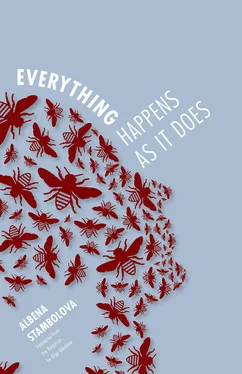When he came back to the house, everyone was asleep. He wished things could stay this way forever. Halcyon silence dripped from the trees. He felt strong like never before. The missing link with his parents was finally found. He could be their son, now that Maria was here.
One evening Margarita tripped over two enormous suitcases lying in the dark hallway. She knew immediately why they were there. She knew that what had happened to her father, and later to Valentin, was now happening to Boris.
It was his turn to leave. Nothing could be done to prevent it. Maria had made up her mind.
Margarita could vaguely sense that she was the only one with any influence over her mother. But she had no idea what she could do.
Boris was not in the house. The suitcases were there, but he was gone. Her mother had also gone somewhere. Margarita decided to open the suitcases. She reached for one of them.
The metal locks were lovely; they were cold and made a clicking sound. She lifted the lid and, pushing it back, propped it against the wall and blocked the entire hallway. There were no clothes in the suitcase, only books, folders, floppy disks and various little devices with a mysterious purpose. They were so small and shiny; she liked them very much. She was not sure what one was supposed to do with them. Just look. Then what? Margarita pressed a button and heard a voice. Boris’s voice saying things she couldn’t understand. She kept listening to the recording and played the whole thing. Boris barely ever spoke, yet here, in the dark hallway, his voice seemed to have a life of its own. Boris and the voice of Boris were separate. Margarita was not surprised, it seemed natural to her. She found a box full of tapes and began to play them one by one. When she started to feel cold, she got into the suitcase, where the hard objects made room for her. She nestled cozily, listening to the fairy tales of the voice from the little machine. Boris was good at telling stories. Margarita could see that right away. This Boris from the machine was a different Boris that no one had heard speak before and no one had ever met. These stories were meant for nobody, or maybe nobody and Margarita. It didn’t occur to her to ask why Boris was telling them. She just followed his voice in this exciting adventure, and there was suspense and something important was about to happen; things were becoming more and more interesting, and she fell asleep just before what seemed to be some kind of beginning. The lid of the suitcase closed itself gently, so as not to wake her, and in the darkness inside, Boris’s voice went on speaking.
The sweaters Maria knitted for her men never left the house for good.
They would leave for a while on someone’s back, then they would return to be washed or mended, and they would leave again, not necessarily on the same shoulders.
Margarita remembered what had happened with her father. In the beginning, like a guest in a boarding house, Philip would have only dinner with them. Maria would retire to bed early and he would stay alone with the twins for hours. He would come and go with bags full of clothes. He would always change, never leaving with the same clothes in which he arrived.
They would sit at the table and Philip would talk about his work. Valentin would try to appear interested, but Margarita would simply stare absently, as usual. Her father was here and that was enough. At some point Philip and Valentin would grow bored. But not Margarita, because she never took part in any of the conversation. Valentin would excuse himself, saying he had to wake up early, and Philip would feel confused. Had he left them already? He wasn’t sure. He couldn’t explain why he no longer slept at home. The many glasses of wine he drank made him talkative at first, but then he became withdrawn, as if descending into something, some place to which Margarita often tried to find entry. They would sit with this nothingness between them, so dense and heavy that it forced them to turn inward and search for something inside, each searching alone.
Philip would walk with Margarita to her room, then go about doing whatever he was doing. They let him wander around the house like a ghost. And he probably did wander like a ghost. By morning he was always gone.
He would leave behind clothes strewn here and there around the rooms. Maria would carefully pick them up, and wash and iron them. That was all. Their father was a pile of clothes Maria took care of. He would happen to appear inside these clothes for a brief moment during his increasingly rare visits, and that was it. The twins began to perceive his presence as fortuitous, feeling that they knew him less and less. Then their father started wearing unfamiliar clothes, which he no longer left in the house, until, finally, the thread connecting all of these things became so thin that when she saw Maria knitting another sweater, Margarita asked her who it was for.
Her mother looked at her without saying anything, as she always did, and looked at her for so long that Margarita realized the answer was irrelevant. Anyone could wear this sweater, even her father — who was wearing it, who had worn it before, who would wear it after, for how long — none of these made any difference to the sweater itself.
16. Spiders and Their Webs
There is marvel in the world. Nobody has taught us how to marvel, and that is why no one knows what marvel is.
To look from the inside out and from the outside in are two different things.
Margarita bumped into walls all the time. It hurt. But Margarita knew how to stare at a thing long enough to obliterate the difference between inside and out.
She would often hide, for example, in the spider’s web in the corner of her room.
Her favorite spider. From here the filaments and threads looked like a thicket. A thicket full of glimmer.
Valentin would be raging down there, furiously shaking what he believed to be Margarita, and she would be swinging on the filaments up here, laughing.
Margarita was unable to concentrate on anything. She was proverbially absentminded — these were the words people used to describe her. The moment she managed to focus on something, she was frightened by what she saw. She preferred to float around things rather than see them. Besides, she rarely felt she was in any danger.
Margarita’s brain clicked like a camera shutter. She would close her eyes and when she opened them again, the world would be different. People lived in this world, and she lived with them. She was like an amiable, myopic insect.
However, she was now old enough to know a few things. There were rules for dealing with people. Rules meant to make sure she didn’t scare anyone. Simple rules.
She had realized long ago that she frightened her father. She did her best to avoid causing him worry. She tried hard to behave the way he expected her to. But that was as far as it went. Margarita was, after all, Margarita, and even her father would never be able to understand her.
Most of the time she played the piano for him. Music brought back something in him, something he loved but could not reach in any other way. When his daughter played the piano, Philip admired her ability to remember scores. But soon enough he would forget about the scores and surrender to the music — the way, he remembered, he had surrendered to Maria.
He was aware that something inappropriate was taking place. It was huge and it was not supposed to happen.
Margarita would always sense when the current would start trickling out of her father. As if Philip’s surface had cracked. She would stop playing then. It was her way of showing her love.
Читать дальше











